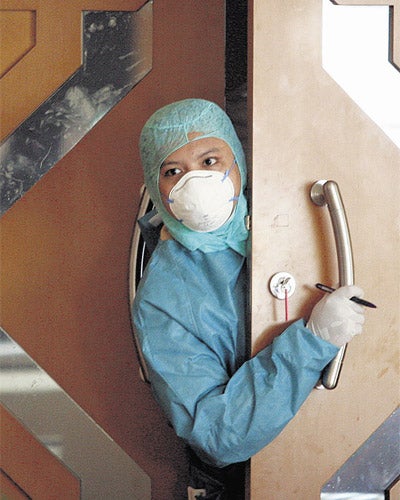Global swine flu deaths top 1,000
House of Lords committee critical of Britain's preparations for pandemic

The global death toll from swine flu has topped 1,000 as the virus sweeps around the world.
Latest figures published by the European Centre for Disease Prevention and Control (ECDC) in Stockholm show 1,012 deaths had been reported up to yesterday.
The figure is almost 200 higher than reported by the World Health Organisation. A spokesman for the ECDC said the organisation obtains its figures from ministry of health websites, which are more up to date, while the WHO has to await official notification of deaths.
Swine flu has spread to 30 of the 31 countries in the EU. Two more deaths were reported from Spain yesterday, bringing the country's total to six deaths. With one death recorded in Hungary, the UK is the only other EU country where swine flu has so far proved fatal, causing 30 deaths up to last week.
Peers yesterday praised the British Government for stockpiling anti-viral drugs like Tamiflu sufficient for half the population and negotiating advance purchase agreements with pharmaceutical companies to supply a vaccine against swine flu for the whole population. But the House of Lords Science and Technology Committee criticised the late launch of the interim National Flu Pandemic Service last week, which had been due to be delivered and tested in the spring.
It also questioned whether there were enough intensive care beds to deal with the expected second wave of swine flu in the autumn. The Department of Health said intensive care bed capacity could be doubled "under a severe attack phase" by cancelling routine surgery, which occupies about half the beds.
Lord Sutherland, chairman of the committee, said: "While the Government have got some things right in preparing for a flu pandemic, such as the stockpiling of anti-virals, there are other areas where we appear to be under-prepared."
Nurseries and childminders were urged yesterday to take soft toys away from children to stop the spread of swine flu.
Guidance published by the Department for Children, Schools and Families (DCSF) said hard toys should be cleaned after use as the virus can survive on hard surfaces. It added: "Try to avoid children sharing soft toys, as these are hard to clean adequately; you may find it easier to avoid using soft toys altogether."
A DCSF spokesman said: "We are not suggesting taking all toys out of play settings, just to take care with the use of shared toys, which can be a way of spreading infection. This is about striking a sensible balance between continuing life as normal but also taking simple, common-sense steps to protect children."
Professor Angus Nicoll, head of the Influenza Programme at ECDC, said Britain remained the hardest hit country in Europe for three reasons.
"Every virus has to start somewhere. You might as well ask why the West Midlands is worse affected than the East Midlands, or South Australia rather than the rest of the country.
"Secondly, in summer transmission of the virus is not that efficient. We are not seeing this thing moving as fast as in Australia and the southern part of South America. Other countries will catch up.
"Thirdly, the UK has stronger connections with other parts of the world through its position as an international travel hub. All the modelling shows viruses will tend to break out first in the UK before other European countries."
In the US, the cities of Seattle, Chicago and New York are badly hit, but the towns of the Mid-West remain relatively unaffected. "Even in the cities of the Mid-West we are not finding much yet. It will come in the autumn."
In Europe, Spain appears to have plateaued, while cases are creeping up in Germany, Professor Nicoll said. In France, Health Minister Roselyne Bachelot last week abandoned the country's strategy of treating swine flu victims in hospital to curb the spread of the virus, acknowledging the disease had spread too far to be contained.
Professor Nicoll said he expected swine flu to peak in Britain within days, if it had not done so already, before returning in the autumn. He commended Britain's "extraordinary effort" to prepare for the pandemic, which other countries had declined to follow. "They have said they are not going to attempt to delay the spread of the virus. They looked at what Britain had done and felt they could not follow it."
Join our commenting forum
Join thought-provoking conversations, follow other Independent readers and see their replies
Comments
Bookmark popover
Removed from bookmarks